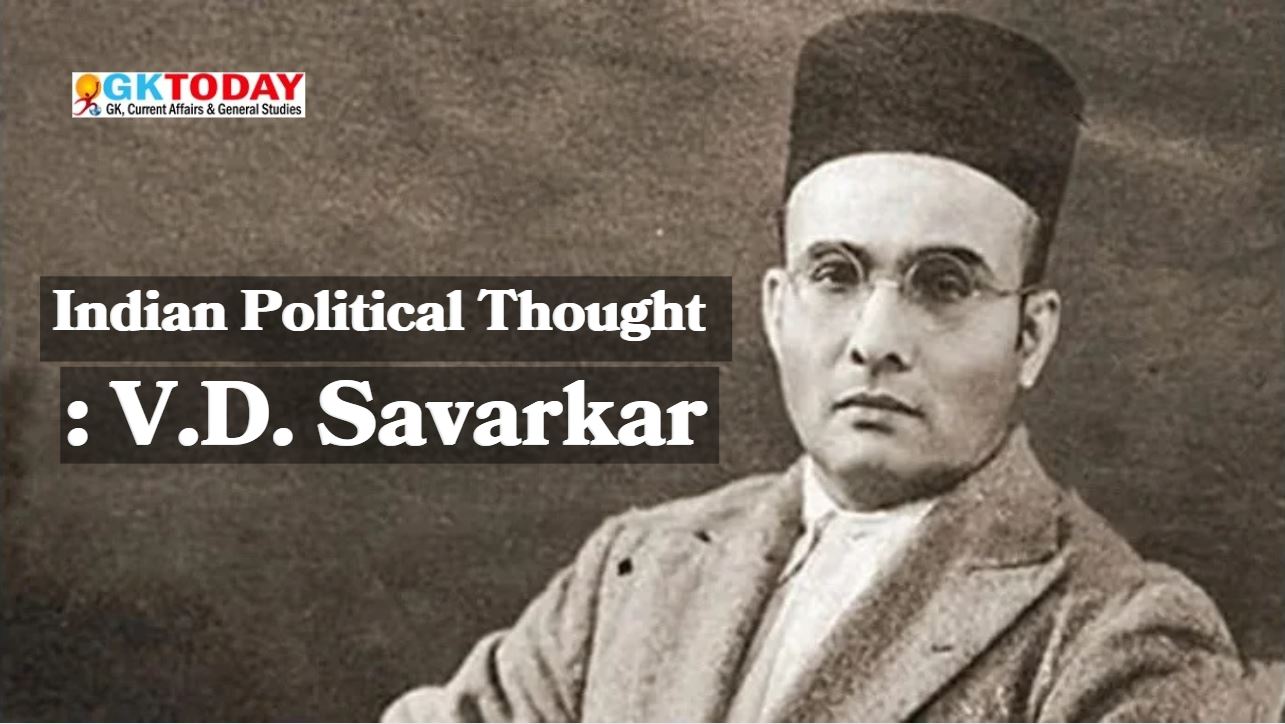Indian Political Thought: V.D. Savarkar
Vinayak Damodar Savarkar was a prominent figure in Indian political thought. His contributions to the ideologies of Hindutva and nationalism have left imprint on contemporary Indian politics.
Biographical Overview
Savarkar was born on May 28, 1883, in Bhagur, Nashik, Maharashtra. He was a bright student and pursued higher education at Fergusson College in Pune. Later, he moved to London for further studies, where he became involved in revolutionary politics. He passed away on February 26, 1966.
2. Political Ideology
Savarkar’s political ideology is characterised by several key concepts:
- Hindutva: This concept promotes Hindu nationalism. It emphasizes the cultural and historical unity of Hindus as a distinct identity.
- Two-Nation Theory: Savarkar argued that Hindus and Muslims represent two distinct nations, contributing to the demand for a separate Muslim state.
- Anti-colonialism: He advocated for armed resistance against British rule, believing in the necessity of revolutionary activities for independence.
Key Works
Savarkar authored several influential texts:
- “Hindutva – Who is a Hindu?” (1923): This book articulates the philosophy of Hindutva, defining Hindu identity in cultural and national contexts.
- “The First War of Indian Independence” (1909): A historical account of the 1857 uprising, which Savarkar termed the first war of independence.
- “Six Glorious Epochs of Indian History”: This work narrates Indian history, denoting Hindu achievements.
Political Activities
Savarkar was actively involved in political movements:
- Founding of the Hindu Mahasabha: Established in 1915, this organisation aimed to promote Hindu interests and unity.
- Revolutionary Activities: He was associated with the Abhinav Bharat Society, which plotted against British officials.
- Imprisonment: Savarkar was arrested in 1909 for sedition. He received a life sentence and was imprisoned in the Andaman Islands’ Cellular Jail.
Views on Society and Culture
Savarkar had distinct views on Indian society:
- He advocated for the revival of Hindu culture and traditional values.
- Critiqued Westernization, promoting indigenous traditions instead.
- Stressed the importance of a unified Hindu identity to counter perceived threats from other communities.
Legacy and Influence
Savarkar’s legacy is complex:
- He influenced the ideologies of the Rashtriya Swayamsevak Sangh (RSS) and Bharatiya Janata Party (BJP).
- Some view him as a martyr and nationalist, while others criticise his communal views.
- His ideas continue to shape contemporary Hindu nationalist discourse in India.
Controversies
Savarkar remains a polarising figure:
- He was accused of involvement in the assassination of Mahatma Gandhi. Although acquitted, this association has sparked debate.
- His interpretations of history and nationalism have been contested by historians and political analysts.
Philosophical Contributions
Savarkar’s philosophy centred around several key ideas:
- He advocated for a strong, centralised state to protect Hindu interests.
- Believed culture plays important role in nation-building, asserting that a nation is defined by its cultural identity.
Recognition
Savarkar received posthumous recognition:
- Various memorials and institutions have been named after him.
- His birthday is celebrated by numerous Hindu nationalist organisations.
Criticism
Savarkar faced criticism:
- He has been critiqued for promoting a narrow definition of Indian identity based on religion.
- Accused of encouraging communal tensions and divisive politics, his legacy remains contentious.
The ideologies of Savarkar, particularly Hindutva, have deeply influenced the political landscape of India. While revered by many, he is equally controversial, prompting ongoing debates about nationalism and identity in the country.



Homan Sahu
December 18, 2017 at 11:18 amBank sakhi salary & commission kya rahega.